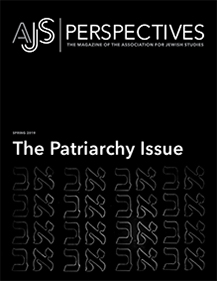Dear Colleagues,
It seems there’s no better time for Jewish Studies to tackle the patriarchy. Against the background of the #MeToo movement and a brighter spotlight on oppressive societal systems and structures, we’re becoming more aware than ever of the power dynamics that privilege certain voices, bodies, and scholarly work over others. We’re becoming more aware of how patriarchal habits seep into our classrooms and conferences. And we’re becoming more aware of what we can do to address these tendencies.
This Perspectives issue—the Patriarchy Issue—is, in part, a response to a call to action. The pieces that follow seek to unmask, elucidate, question, or reconceive patriarchal structures in Jewish Studies. They are a necessarily small sample of research essays, fiction, and personal narratives that expose the anxieties underlying patriarchal dominance, that center voices and experiences often considered marginal, and that rethink conventional assumptions about how the patriarchy operates. Under the heading “Expanding the Canon,” we also highlight several shorter essays that expose the exclusion of women’s creative and intellectual work from a variety of Jewish Studies subfields.
As the new editors of AJS Perspectives, we would also like to draw your attention to two special sections in the issue we intend as permanent features: a section on the profession, and a section on pedagogy. As we encourage scholars to tackle particular research themes we also hope to turn these same lenses on ourselves as academics and teachers. How do these themes play out in our classroom? Where do these dynamics manifest in our professional lives?
For this Patriarchy Issue, the section on the profession carries particular salience. We would like to highlight four personal essays, by Keren McGinity, Karla Goldman, Mika Ahuvia, and one anonymous author, that detail painful and harrowing journeys of defying or negotiating patriarchal structures in our field. Two of the essays discuss the conformism expected of women scholars in order to succeed: Goldman narrates the process of her termination when she could not fit into the boys’ club; Ahuvia details the sacrifices she made when she adapted to patriarchal expectations—and her desire to undo the damage. The other two essays reveal the support our field has bestowed on harassers and assailants for far too long. McGinity describes how a #MeToo moment led to what is hopefully a reckoning and course correction; the other (anonymous) author relates her experience of secondary, institutional harassment after filing a complaint. In the case of the essay published anonymously, legal counsel pointed us in the direction of removing the author’s own byline against her wishes. Perhaps this too is an expression of the patriarchy that sometimes exerts a type of paternalism when what the author is craving is full-throated agency. The experience of publishing these four essays reminds us of how far we have yet to go in dismantling the patriarchy’s work of suppression and silencing.
We'd like to thank Karin Kugel for her outstanding work in shepherding the Patriarchy Issue to production. Finally, we’d like to dedicate this issue to the memory of Jonathan M. Hess, whose fine leadership, along with that of Laura S. Lieber, helped inspire us to continue to identify pressing themes worth examining as a field, and to listen attentively to diverse voices.
Chaya Halberstam
King’s University College
Mira Sucharov
Carleton University


